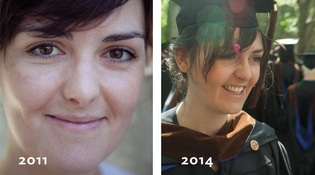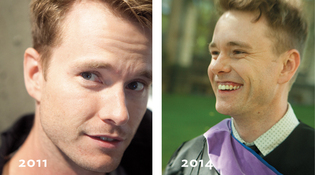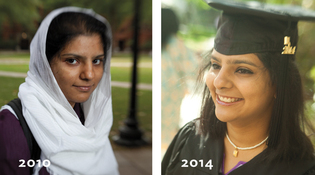
Mark Ostow
Kate Noll
Berkeley, CA
MFA, School of Drama
What has stood out for you during your three years here?
Having Ming Cho Lee [the stage designer] as my professor. [See “Framing Space, Using Light,” January/February 2014.] He’s a legend. He can be like an oracle: even if you don’t understand things in the moment, you can sort of intuit the wisdom and bring it back later, and think, “Oh… aha!” I think secondary to the education that Ming Cho Lee gives us here is the network of people that you are connected to. They don’t call it the Yale mafia for nothing.
And [design professor] Jane Greenwood. She has shown me, and us, that costume design is not just about fabric. A lot of it is excavation into history: you have to figure out the social context and the political context and the personal context of each of the characters to know what they would wear.
When you first arrived, you told me you’d come here to “gain some clout,” to avoid remaining a perennial assistant. Has that worked out?
I have an officially informed opinion now that I did not have before. I would never be able to do the work that I do now if I had not come here. I think I have improved a thousand percent, a million percent—an invaluable amount.
What’s next?
Two days after graduating, I’m going down to New York to put up my very first set design, for a comic opera at the Metropolitan Museum of Art called Gloria—a Pig Tale. It’s very cute.

Mark Ostow
Leeland McPhail
Atlanta, GA
MArch, School of Architecture
What has been your most memorable experience?
Traveling to Dhaka, Bangladesh [to design a garment factory], and becoming immersed in an alien landscape. We had to reimagine what a factory type could be for Bangladesh, thinking about land, thinking about labor relationships, thinking about economies of scale, about materials and social sustainability.
Do you plan to return to Bangladesh?
[No], but we don’t know in what ways these things influence us.
You’re in your mid-30s. What have you done here that you might not have, had you been younger?
I would go to “crits” in the painting department. I got let into how another discipline at a high level thinks about art.
Do you think that will influence your practice of architecture?
Thinking about the discipline of painting could only make my thinking about architecture richer, allowing for something that is inherently three-dimensional to inform something that is historically only two-dimensional.
I imagine you’ve had a busy three years.
It’s been a whirlwind. Here we are again, three years later. It seemed incredibly fast, incredibly fast.

Mark Ostow
Ayesha Muhammad
Karachi, Pakistan
Branford College, chemistry
When you arrived at Yale you were thinking of going into medicine. Is that still your plan?
I went to UCS [career services] and they said, “Well, you’re an international student. You may not want to risk it; it’s harder for international students to get in.” So I moved around for two years. I was a chem major, and I was thinking, maybe I will be an art history major and restore things, or maybe engineering is what I should do. I tried to find something else that I am good at and as passionate about.
[Senior year] I showed them my transcript and my résumé [at career services] and I said, “Tell me if I have a fair chance at a medical school in the US.” They said, “Your record looks good. Why don’t you go for it?”
Have you applied?
I’m taking two years off. I’ll be at Mass General [Hospital] in Boston. I’ll be a research coordinator with the Center for Human Genetic Research.
When we met, freshman year, you half-joked that you’d gotten into Yale by mistake.
Oh my God, I’m such a different person now. I’ve developed confidence in my abilities to face life. It’s not going to be easy, but Yale has taught me that it’s going to be OK.
 loading
loading